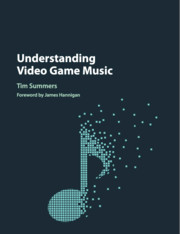Book contents
- Frontmatter
- Dedication
- Contents
- List of Figures, Musical Examples and Tables
- Foreword
- Acknowledgements
- Introduction: Beyond the Candelabrum
- PART I ANALYSING VIDEO GAME MUSIC
- PART II CRITICAL PERSPECTIVES
- 3 Texturing and the Aesthetics of Immersion
- 4 Music and Virtual Game Worlds
- 5 Communication for Play
- 6 Hollywood Film Music and Game Music
- 7 Musical Play and Video Games
- Epilogue: Fun, Play and Music
- Appendix: How to Hear a Video Game: An Outline
- Bibliography
- Ludography
- Index of Games
- General Index
6 - Hollywood Film Music and Game Music
from PART II - CRITICAL PERSPECTIVES
Published online by Cambridge University Press: 05 September 2016
- Frontmatter
- Dedication
- Contents
- List of Figures, Musical Examples and Tables
- Foreword
- Acknowledgements
- Introduction: Beyond the Candelabrum
- PART I ANALYSING VIDEO GAME MUSIC
- PART II CRITICAL PERSPECTIVES
- 3 Texturing and the Aesthetics of Immersion
- 4 Music and Virtual Game Worlds
- 5 Communication for Play
- 6 Hollywood Film Music and Game Music
- 7 Musical Play and Video Games
- Epilogue: Fun, Play and Music
- Appendix: How to Hear a Video Game: An Outline
- Bibliography
- Ludography
- Index of Games
- General Index
Summary
Ever since the inception of the video game, the medium has looked to other moving-image media for inspiration – games based upon Star Trek have been documented from the late 1960s and Atari produced a game based on Jaws (dir. Spielberg, 1975) in the same year as the film's release. Films and television have influenced games in many and varied ways, from subject matter to narrative tropes and the emulation of cinematic styles in games, reaching far beyond games based on specific films. While advancing technology continues to facilitate the ever-closer replication of cinematic visuals by games, it is important to recognize the diversity of video games and not to paint a reductive picture of games simply becoming incrementally ‘more cinematic’ over time. Cinema's influence on games is more complicated than simple imitation. Music in games is a microcosm of this cross-media interplay: game music sometimes adopts materials, processes and aesthetics of film music models, but it must still constantly attend to its medium-specific properties that provide the appeal of the video game as a distinctly different media form.
It is unsurprising that there should be a close and complicated relationship between game music and music in films. After all, video games are superficially similar to the other narrative audio-visual fiction media with which nearly all Western media consumers have some experience: television episodes and films, especially those in the English-language Hollywood tradition. Game music is challenged to negotiate a balance between two factors – the particular demands of the video game medium, and the players’ interpretive framework and expectations for moving-image media that they have learnt from film and television.
Noted game composer George “The Fat Man” Sanger claims that the impulse for the musical similarity of games and film is driven by two main issues, both of which he sees as negative. First, he believes that games emulate films in an attempt to gain the artistic legitimacy and prestige afforded film. This suggestion explains why it is cinema, rather than the historically lower-brow medium of television, that is more often emulated by games. Certainly, video games have courted and trumpeted the involvement of film composers, and audio practitioners have reported how a specifically cinematic style has often become a guide for their work.
- Type
- Chapter
- Information
- Understanding Video Game Music , pp. 143 - 177Publisher: Cambridge University PressPrint publication year: 2016



